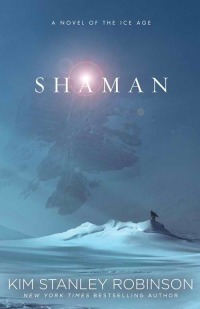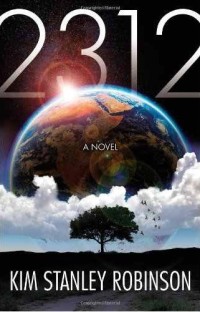Shaman by Kim Stanley Robinson
 Monday, September 2, 2013 at 10:53AM
Monday, September 2, 2013 at 10:53AM 
Published by Orbit on September 3, 2013
Kim Stanley Robinson is full of ideas. The danger in a KSR novel is that he will develop his ideas with enthusiasm while relegating the plot and characters to the status of afterthoughts. When -- as in Shaman -- KSR decides to tell a story rather than disguising a series of essays as a work of fiction, he is a talented writer. In Shaman, KSR avoids pedantic lectures while achieving a blend of humor and poignancy in a solid, enjoyable novel.
In a departure from the work for which KSR is best known, Shaman looks at the past rather than the future, probing prehistoric characters to reveal the essential and enduring features of humanity. The novel begins with a rite of passage as adolescent Loon, sent naked into the woods on the night of the new moon, begins a wander from which he must not return until the full moon rises. Loon eventually ingests some mushrooms to induce a vision, a necessary step if he is to follow Thorn's teachings and become a shaman. Raised by Heather and Thorn after his parents died, Loon is restless (and like all young men, hormone-driven). He is an unwilling apprentice with little interest in becoming a shaman, although he admires Thorn's cave paintings. Thorn teaches him songs and poems that recall the past but Loon is focused on the future. He looks forward to the pack's summer trek and the festival at which a score of packs gather, in part because it provides his only opportunity to meet new girls.
The plot meanders a bit but it is largely the story of Loon's young life, and since lives meander, it isn't surprising that the plot does. At the novel's midway point, however, a story breaks loose when someone close to Loon disappears, sending Loon on a search to distant northern lands. At some point the story becomes one of hunter and prey; at another point it is a tale of wilderness survival. It's a good (but not a great) coming-of-age story that offers few surprises. Character development is strong and the plot is credible. To create an interesting change of pace, KSR occasionally departs from the main characters to focus on an outsider. Now and then KSR gives us an anthropomorphic look at the world through the eyes of a cat or a wolverine.
Robinson leaves it to the reader to give meaning to the poems of the past, a refreshing change from novels in which he spells out the past and present in excruciating detail. That's not to say that Shaman lacks detail. Robinson is known for his world-building, and his ability to create an imagined Earth of the distant past is just as impressive as his construction of an inhabited Mars of the relatively near future. This is a familiar world of rivers and onions and pine needles, a world abundantly populated by ravens and trout, lions and bears, all having symbolic significance to the tribal people who share the land with them. It is in fact the people -- their social organizations, customs, behaviors, and folklore, the hardship of survival and the joy of friendship -- that make Shaman memorable. From mating to domestic discord, behavior is recognizable, but dissimilar enough to be a convincing account of a distant time. The differences between northern and southern tribal peoples are akin to differing political philosophies: competition versus cooperation (perhaps the forerunners of capitalism versus socialism). Like all of KSR's work, Shaman is a book of ideas, here drawn from anthropology, sociology, ecology, and economics. Unlike some of KSR's novels, however, the ideas are expressed with subtlety, are carefully integrated into the story, and never get in the way of the plot that conveys them.
RECOMMENDED
